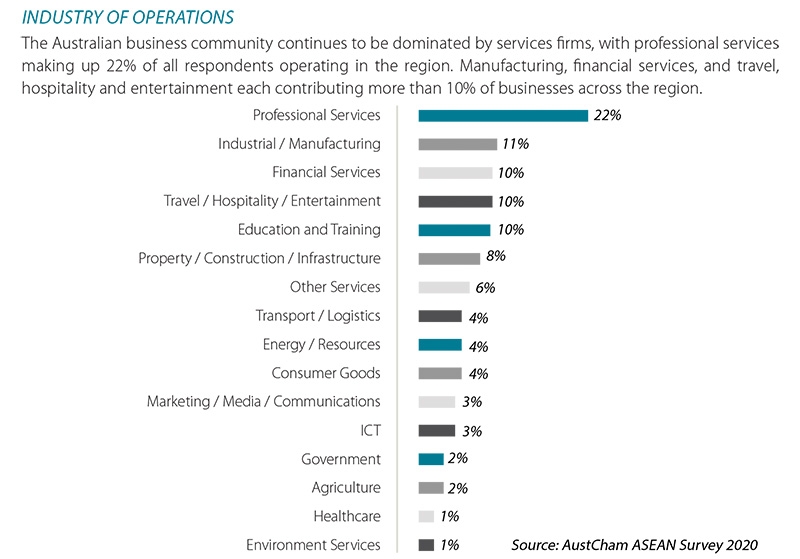Australian ties forge ahead via integration
 |
| Chau Ta, vice president of AusCham Vietnam |
Where is Vietnam placed among Australia’s partners in the ASEAN region?
Vietnam is one of Australia’s most important trade and investment partners in the bloc. Currently, Vietnam is Australia’s fifth-largest ASEAN trade partner behind Singapore, Thailand, Malaysia, and Indonesia with bilateral trade hitting a record $14.6 billion in 2018. Importantly, Vietnam is one of Australia’s fastest-growing trade partners, with two-way trade growing faster than many of Australia’s largest trade partners.
Vietnam’s demand for Australia’s agriculture, energy, and education exports, and Australia’s appetite for Vietnamese electronics and textiles are driving much of this trade growth.
Vietnam’s attractiveness to Australian investors includes its political stability, skilled workforce, and good geographic location. Vietnam’s incredible recent growth rate – 7 per cent in 2019 – also helps demonstrate the significant economic opportunities in Vietnam to Australian investors. Australian companies such as RMIT University, Swinburne University, Sunrice, ANZ, Austal, and DEK have made many high-quality investments in Vietnam, particularly in the education, agriculture, financial, and advanced manufacturing sectors. As Vietnam’s economy continues to grow, AusCham Vietnam will continue to work with the Australian government to encourage and support more Australian companies to enter this dynamic market.
 |
What are the factors that can make the Vietnamese market the most attractive market to Australian investors in the ASEAN?
In February and April, AusCham ASEAN undertook its fifth annual Australian Business in ASEAN Survey. This included an additional COVID-19 Impact Survey in April. The results of more than 580 companies that responded to the survey across the region showed that, in 2019, Vietnam had retaken its mantle as the most popular destination for planned investment by Australian businesses.
It was considered that Vietnam’s very successful solar energy programme (which saw approximately five gigawatts of solar power installed and operating in 2019) and the shift of manufacturing from China to Vietnam was at the heart of this investment surge.
The survey shows that to Australian businesses, Vietnam is one of Asia’s great economic success stories of the past 30 years. It is projected to remain among the world’s fastest-growing economies over the next decade, and one of Asia’s best investment destinations.
Vietnam continues to be identified as one of the most likely places for Australian expansion across the ASEAN, with professional services and education and training taking up 40 per cent of the Australian business community in Vietnam, and hospitality and manufacturing firms accounting for a further 30 per cent of the business community. Australian businesses operating in Vietnam continue to grow and diversify in size and the AustCham ASEAN Survey 2020 shows that the Vietnamese economy remained robust in 2019, with expansion underpinned by strong domestic demand, resilient manufacturing, and solid foreign direct investment.
Australian businesses operating in Vietnam have reported that business conditions were positive through 2019 and into 2020, with half of firms reporting improved profitability. This is much due to the government’s continuous efforts in implementing reforms in administrative and entry procedures for foreign investors into Vietnam, and slowly but progressively improving and investing in improving infrastructure and transparency.
Further, the positive business optimism in Vietnam remains. The country’s stellar performance in the continuous management and control of COVID-19 and particularly in the context of China+1 and the US-China trade dispute, has put Vietnam in the global spotlight – showing that it remains a safe place to do business.
In joining the Comprehensive and Progressive Agreement for Trans-Pacific Partnership (CPTPP), Vietnam not only vows to opening up markets but also removing tariff barriers, continuing to open and facilitate trade, and continuing to exhibit transparency in state management of market development. How will these factors affect business activities and development strategies of Australian enterprises here?
Vietnam’s international economic integration has been one of the drivers of its recent economic growth, and the country’s commitment to open and rules-based trade is commendable. The CPTPP is the most ambitious free trade agreement Vietnam has ratified, and both our countries stand to benefit from greater market access, reduced tariffs, and regulatory certainty under the agreement.
AusCham Vietnam encourages Vietnam to continue to implement its CPTPP commitments as only through full and timely implementation will both Australian and Vietnamese enterprises maximise the benefits of the CPTPP.
What are the prospects for attracting Australian investors into Vietnam and increasing collaboration with Vietnamese counterparts?
Australian companies are world-leading in many economic sectors. As mentioned, Australian firms have made a number of important and high-quality investments in Vietnam’s education, agriculture, financial and advanced manufacturing sectors. We think there are many more opportunities to grow Australian investment in these sectors, and to look for new opportunities in tourism, healthcare, and technology.
AusCham Vietnam’s members have made many successful investments in Vietnam and have partnered with a number of the country’s leading enterprises who continue to promote, work with, and assist Australian investors looking to enter the Vietnamese market.
What the stars mean:
★ Poor ★ ★ Promising ★★★ Good ★★★★ Very good ★★★★★ Exceptional
Themes: Drive ASEAN Forward
Related Contents
Latest News
More News
- NAB Innovation Centre underscores Vietnam’s appeal for tech investment (January 30, 2026 | 11:16)
- Vietnam moves towards market-based fuel management with E10 rollout (January 30, 2026 | 11:10)
- Vietnam startup funding enters a period of capital reset (January 30, 2026 | 11:06)
- Vietnam strengthens public debt management with World Bank and IMF (January 30, 2026 | 11:00)
- PM inspects APEC 2027 project progress in An Giang province (January 29, 2026 | 09:00)
- Vietnam among the world’s top 15 trading nations (January 28, 2026 | 17:12)
- Vietnam accelerates preparations for arbitration centre linked to new financial hub (January 28, 2026 | 17:09)
- Vietnam's IPO market on recovery trajectory (January 28, 2026 | 17:04)
- Digital economy takes centre stage in Vietnam’s new growth model (January 28, 2026 | 11:43)
- EU Council president to visit Vietnam amid partnership upgrade (January 28, 2026 | 11:00)

 Tag:
Tag:




















 Mobile Version
Mobile Version